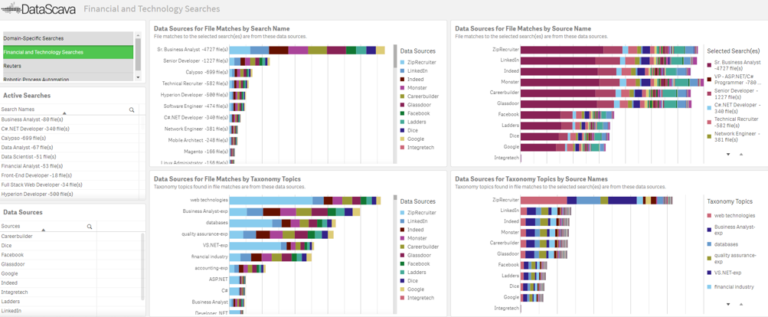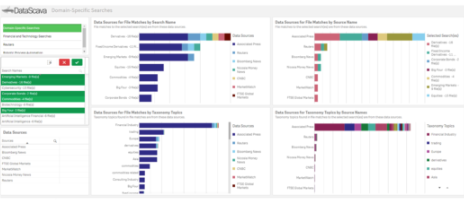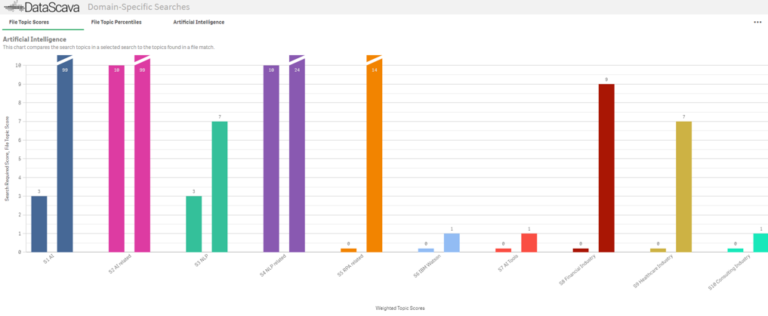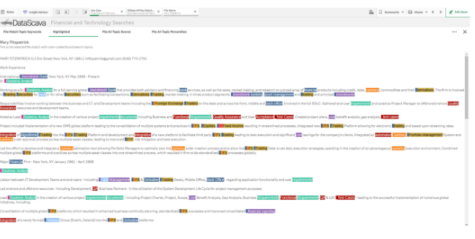Built on the same core methods behind DataScava, TalentBrowser’s Domain‑Specific Search uses business-and domain-specific language captured in taxonomies you define and control to index, mine, and measure the raw textual content on your resumes, profiles, and job descriptions.
Whether you’re recruiting or hiring in technology, finance, healthcare, legal, or other jargon-intensive domains, TalentBrowser can help you find the right faster and with greater efficiency.
How It Works
Domain-Specific Search is powered by DataScava’s deterministic stack:
- DSIndex |Domain-Specific Language Processing (DSLP)
- DSTopics | Tailored Topics Taxonomies (TTT)
- DSMatch | Weighted Topic Scoring (WTS)
Unlike AI, LLMs, NLP, or semantic toolkits that use probabilities to “guess” at meaning, TalentBrowser uses Machine Training + Human Intelligence — a deterministic, explainable, transparent, and user-controlled approach that homes in on exactly what you care about.
Its algorithms use your personalized taxonomies to generate structured metadata at the file level— including weighted topic scores about each person’s skills, roles, experience, education, location, and more — used to mine, match, filter, and route people to jobs with precision.
This metadata can be utilized in Talent Matching, People Analytics, HR reporting, Business Intelligence, and other initiatives — surfacing deterministic signals at the file level for each candidate in your database.
Precision Talent Discovery
Company-specific Job Search templates allow users to set “required” and “nice-to-have” thresholds for each topic — helping you home in on true domain expertise while filtering out generic matches that don’t meet your standards.
Candidates who pass a simple Boolean search but lack depth in critical skills are filtered out. And the false positives often generated by generic NLP or semantic tools — a frequent complaint in recruiting — disappear entirely.
Auto-generated metadata flows into your dashboards, search results, and analytics — making it available in TalentBrowser or any integrated talent solution or workflow.

Tailored Topics Taxonomies (TTT)
TTT allows you to define, import, or fine-tune company- and domain-specific topics and their associated key terms — capturing how you think about your operations, technology, products, and priorities.
We offer editable, high-precision taxonomies developed in-house over a decade for Finance and IT, or we can work with your existing models.


Weighted Topic Scoring (WTS)
WTS combines multiple weighted topics into each search, returning documents that meet or exceed user-defined thresholds.
- Left bar = required threshold
- Right bar = file’s calculated score
This visual scoring framework delivers transparent, sortable relevance — no guessing, no black box.

Highlighter for Refinement and Review
TalentBrowser’s Highlighter tool supports TTT refinement by clearly showing which terms triggered which topic scores. All key terms are color-coded and highlighted in context, enabling fast topic debugging and refinement.
Combined with multi-sort, rank, and filtering, this makes search and scoring explainable and actionable at scale.

Encapsulate Business Intelligence
With TalentBrowser, your organization’s evolving knowledge becomes a customizable search engine — available at the earliest stage of every hiring or talent decision.
You gain insight into individual and corpus-wide skills by topic, taxonomy, and source — enabling automatic, ongoing candidate filtering with total transparency.
Navigational vs. Research Search
As noted by Google Custom Search pioneer Ramanathan V. Guha:
“In navigational search, the user is trying to find a particular intended document. In research search, the user is gathering broad information from many sources. Semantic tools tend to support research search — not navigational.”
In recruiting, we are not “researching” resumes — we are navigating to the right match. That’s why TalentBrowser is purpose-built for Navigational Search — delivering pinpointed, deterministic results, not fuzzy hits.
Discover how Domain-Specific Search keeps you in control — with structured insight, not black-box guesses.


